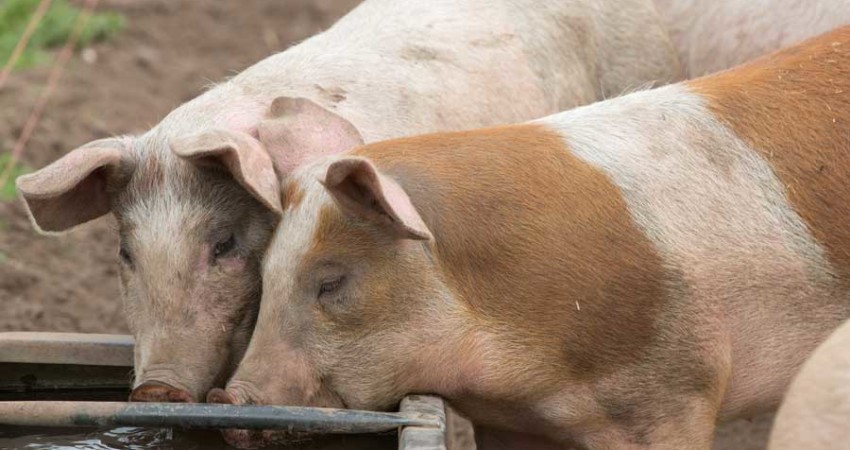

Increasing the weight of a pig requires giving it the right food. If the pig doesn’t gain weight as fast you’d like, you should reduce its fiber intake while adding fat and sugar to its diet. Choosing the right protein and grain sources are also important elements of making your pig gain weight. Beyond making the right dietary choices, keeping your pig healthy and housed comfortably will encourage weight gain.
1. Feed your pig food that is low in fiber. Since fiber takes more energy to digest, the pig will end up expending more calories when eating fiber than it would when eating a less fibrous food. In other words, a high-fiber diet will reduce the amount of calories that the pig absorbs and turns into fat.
Avoid feeding your pig soy hulls, wheat midds, and distillers dried grains with solubles.
2. Give your pig feeds with a high fat content. Fat in pig feed comes from poultry, pork, tallow, vegetable oils, and blended animal or vegetable fats. The type of fat that is included in your pig’s feed has little impact on the weight gains it will make. Feed your pig whatever high-fat feed that it finds most palatable, and you find most affordable.
Skim milk, yogurt, and dairy are also foods that can increase pig fat.
Sweet foods with high sugar content — donuts, candy, and cupcakes — can also rapidly increase your pig’s weight.
3. Select a protein source. Meat scraps is a good source of protein. Soybean oil meal is another option. Give your pig a mix of many types of protein. See what the pig likes best, and feed it primarily that type of protein.
Combining soybean meal with a corn diet will provide your pig with well-balanced amino acid levels.
4. Choose a grain for your pig. Whatever you choose, 50% of your feed should be corn. The remainder of your pig’s feed should be a mix of barley, wheat, and sorghum. Feed your pig various grains and see which it likes best. Use the pig’s favorite grain in abundance in order to increase its weight.
5. Increase the amount of food the pig is eating. Weight gain occurs as a result of ingesting excess calories. If a pig is not eating enough food, it will lose weight. If a pig eats over and above the caloric volume needed to maintain its current weight, it will increase its weight.
Increase the pig’s nutrient intake as you increase the amount of food it eats. Take your pig to the vet or nutritionist for blood work and a nutritional analysis. The vet will be able to tell you if your pig is suffering a nutritional deficiency, and what supplements can correct it. Adequate nutrient intake helps your pig absorb calories more efficiently.
Vitamin B12 is an important addition to your pig’s diet. It can help improve feed intake, as well as reduce stress levels and prevent disease in your pig. B12 injections are the best way to go. Talk to your vet about how much B12 your pig should receive.
6. Make the food more appealing. Palatability enhancers are toppings that you apply to your pig’s feed in order to make the food taste better. If your pig enjoys what it’s eating, it will eat more of it, thus increasing its weight. Try several palatability enhancers and see which pushes your pig to eat the most.
7. Add water to the feed. When your pig’s feed is wet, the food will be softer and the pig can more easily ingest it. Pour some water over your pig’s feed in order to turn it into a watery mush or paste.
If your pig really likes one feed, but dislikes another, you should regularly purchase the one it likes. Tasty feed will be consumed in greater quantities and with greater enjoyment than feed that the pig doesn’t like. This will lead to rapid weight gain.
8. Give your pig a variety of foods. Like people, pigs get bored of eating the same thing over and over
 Contact Jaguza Support
Contact Jaguza Support